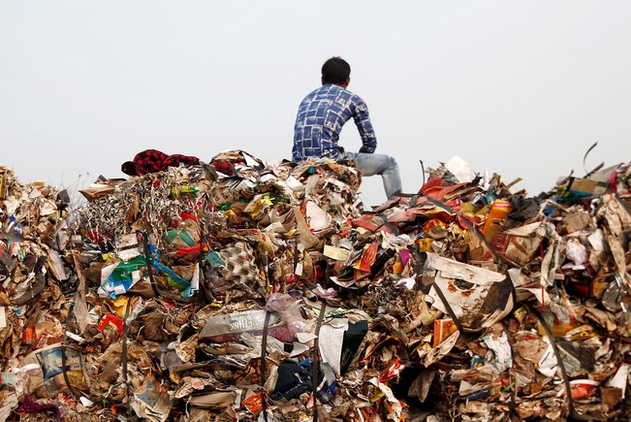World Economic Forum
This City in India Swaps Plastic for Free Meals

Source:REUTERS/Adnan Abidi
India has just launched its very first ‘garbage cafe’ providing food in exchange for trash.
Views
This City in India Swaps Plastic for Free Meals
By Elaine Thelenweb only
Over half of India’s 1.4 billion citizens are living in poverty with many struggling to provide food for their families. The country also has a plastic waste problem, generating 26,000 tonnes of the stuff every day.
So can providing free meals in exchange for plastic rubbish help solve these two pressing issues?
 Collecting plastic to get a hot meal (Image: REUTERS/Parivartan Sharma)
Collecting plastic to get a hot meal (Image: REUTERS/Parivartan Sharma)
India suffers from a level of hunger classed as ‘serious,’ according to the 2018 Global Hunger Index.
The cafe - inspired by other such projects in Belgium and Cambodia - will open in the city of Ambikapur in the central state of Chhattisgarh.
Under the scheme, the garbage cafe, which has been built in a converted bus shelter, will provide a full meal in exchange for 1kg of rubbish, or a free breakfast for 500g of waste.
For example, 1kg of plastic - that would typically take a couple of hours to collect - can be exchanged for a curry with rice, lentils and papadams. For half that weight, customers can receive a breakfast of samosas, lentil doughnuts or stuffed flatbreads.
The collected garbage is then sent to a recycling plant which turns it into plastic granules. And like many of India’s plastic recycling schemes, this shredded plastic is used for road surfacing.
There are more than 34,000 km of plastic roads in the country, mostly in rural areas, and this type of road surface is increasingly popular because it makes the roads more resilient to India’s searing temperatures.
Just 14% of the world’s plastic waste in 2015 was recycled (Image: UNEP report)
Just last year, the country’s prime minister, Narendra Modi, made an ambitious pledge to eliminate all single-use plastic by 2022.
Fulfilling this promise is a huge challenge as India is the fastest growing economy in the world with a population of almost 1.4 billion. And just 14% of the world’s plastic waste was recycled in 2015.
Dealing with the hunger crisis is also critical. The country continues to have one of the world’s highest child undernutrition rates, and has about 195 million undernourished people sharing a quarter of the global hunger burden, according to UN figures.
Have you read?
♦ This School in India Only Accepts Plastic Waste as Tuition Fee
♦ Plastic China: 'I Changed the World by Telling the Truth'
♦ Made-in-Taiwan Biodegradable Plastic, Delivering Big for Starbucks and Apple
Nearly 4 out of 10 children are not meeting their full human potential because they are too hungry to learn, which is leading to poor school performance and increased risks of chronic diseases.
Initiatives such as the garbage cafe have the potential to help some of India’s poorest people find a way of feeding their families at the same time as helping the planet.
Original content can be found at the website of World Economic Forum: This city in India swaps plastic for free meals
This article is reproduced under the permission of World Economic Forum (WEF) and terms of Creative Commons Attribution-NonCommercial-NoDerivs 4.0 Unported License (“CCPL”). It presents the opinion or perspective of the original author / organization, which does not represent the standpoint of CommonWealth magazine.











